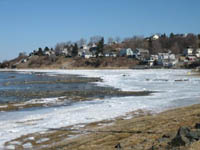Salt marshes mysteriously disappear leaving animals homeless
Pockmarked muck blots this formerly lush marsh on Cape Cod. Dead plant roots jut from barren mud once covered with wavy mats of marsh hay.

New England scientists began noticing dead patches like this one near Lieutenant Island four years ago and called it sudden wetland dieback. Then more such spots were found.
Ecologists warn that saltwater marshes from Maine to Connecticut are suddenly and inexplicably dying, leaving behind land resembling honeycombs, Swiss cheese or an eroded desert landscape.
Few scientists can explain it or recommend what to do. Even skeptics concede something unusual is happening, AP reports.
"It's something that people who have spent their entire careers working in salt marshes have never seen before," said Stephen Smith, a plant ecologist for the National Park Service. "There's no precedent for it."
Salt marshes are wetlands dominated by plant life sheltered from surf and capable of living where coastal waters fluctuate. Losing a marsh means eliminating a habitat for hundreds of fish, birds, shellfish and mammals and destroying a buffer capable of weakening a hurricane's destructive surge.
Southern New England has lost between 50 to 70 percent of its saltwater marshes since white settlers arrived in the 17th century, according to one study. Marshes can migrate to keep up with changing sea levels, but modern development has caged them in.
"There's nowhere for it to go," Smith said. "So, if it's dying, we're kind of worried we may lose that habitat forever."
Life on even a healthy marsh is a bit tenuous. Plants serve as the glue holding everything together. Their roots prevent erosion by anchoring the thin soil. When plants die, they decompose and add nutrients to the peat.
"Take away the plants, you don't have it," said Scott Warren, a botanist who studies tidal wetlands at Connecticut College.
Exactly what is killing those plants remains unknown. Plants on healthy marshes can die when tides push floating tangles of dead plants - called wrack - on top of live plants. If the debris remains in one spot too long, it keeps sunlight from plants on the bottom.
Other potential causes: Mobile chunks of ice can shear off plants. Giant flocks of geese have grazed bare entire Canadian marshes. Rising seas can be equally lethal.
None of these explanations seems to fit in Wellfleet, Smith said. The dead spots he has discovered along the upper reaches of Cape Cod do not seem caused by wrack and he rarely sees large numbers of geese.
Ice would not produce such extensive damage, he said. Rising sea levels would kill plants along the marsh's lowest edge, but the damage appears spread around. Chemical pollution would likely cause damage nearest homes and runoff sources, but that does not appear to be the case.
"You formulate this conceptual model in your head about what may be happening," Smith said. "Then you go up the road two miles and there's a completely different scenario. You end up banging your head against your desk."
That leads scientists to consider more exotic - and controversial - explanations. One is death by acid. After marshes in Louisiana died, researchers there pinned some of the blame on a drought and chemical changes, Warren said.
Seawater contains sulfate, which washes into marshes where bacteria convert it into rotten-egg scented sulfide. A drought, however, allows oxygen to penetrate deeper into the soil.
That oxygen allows different bacteria to turn sulfide into sulfuric acid, which weakens the plants. Weak plants may become susceptible to fusarium, a family of related fungi.
Not all researchers are getting into the dieback bandwagon. Mark Bertness, a marsh ecologist from Brown University in Providence, Rhode Island, criticizes some dieback supporters as overzealous, undertrained and too eager to sound the alarm. In past research, he has faulted fellow scientists for overlooking the role of predators in marsh deaths.
Bertness has visited Wellfleet and said the marshes are teeming with purple marsh crabs that munch on plants. He suspects that natural wrack started the dieoffs and that crabs are eating new plants before they can grow. He is planning an experiment to test the idea.
"I'm definitely skeptical about a lot of the reports, but I'm not skeptical about the whole thing," he said. "We don't need to run around and get people all frantic about some massive die-off."
Subscribe to Pravda.Ru Telegram channel, Facebook, RSS!




